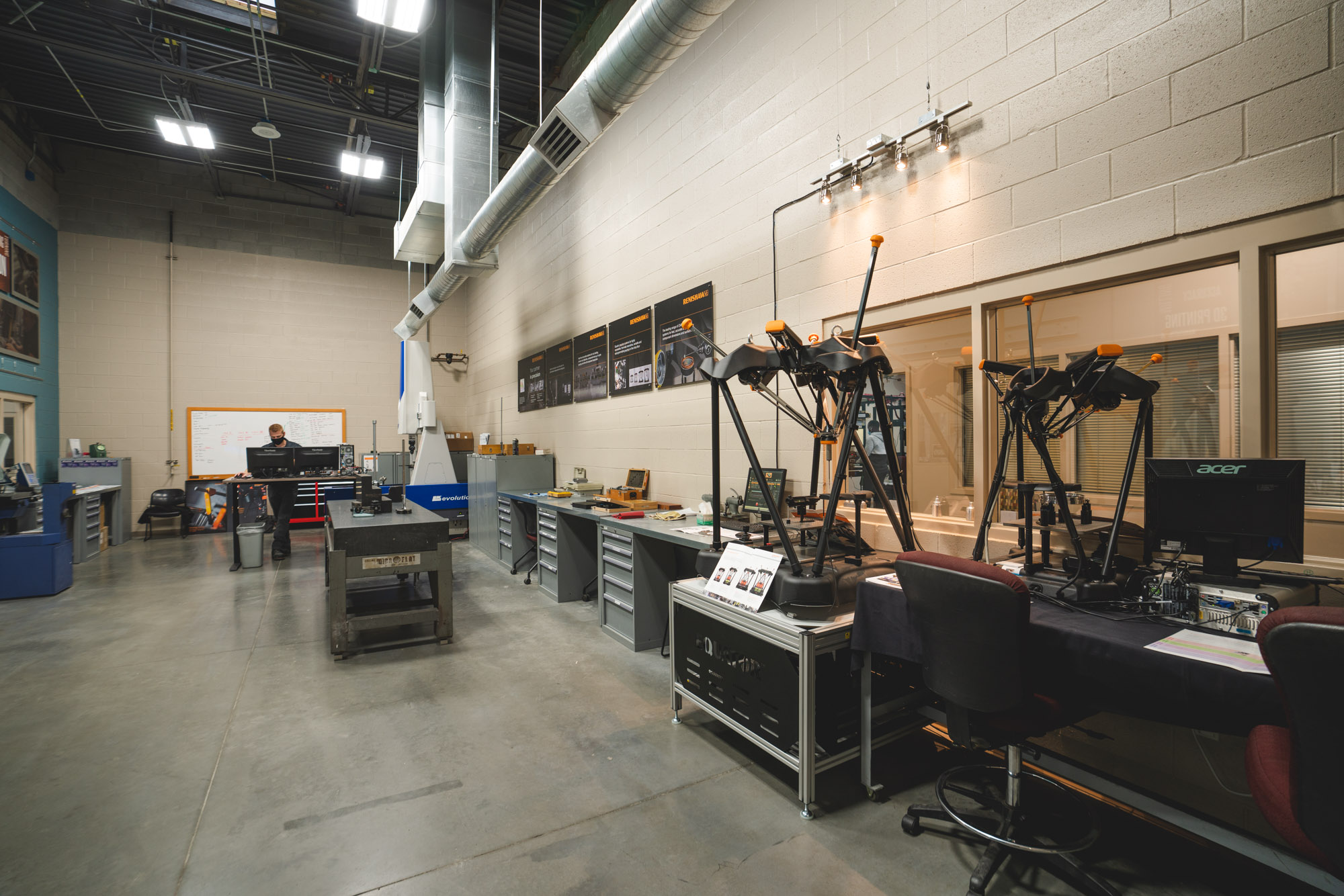 Global engineering technologies company, Renishaw, has partnered with Davis Technical College, a public technical college in Kaysville, Utah, to provide CNC machining students on-site access to co-ordinate measuring machines (CMMs) and other Renishaw equipment to measure components.
Global engineering technologies company, Renishaw, has partnered with Davis Technical College, a public technical college in Kaysville, Utah, to provide CNC machining students on-site access to co-ordinate measuring machines (CMMs) and other Renishaw equipment to measure components.
For more than 30 years, Davis Tech trained thousands of students for a career in industry. Through its partnerships, Davis Tech engages industry, educational and community members to provide shared opportunities for all. Courses include automation and robotics, CNC machining and manufacturing technology.
Renishaw’s US subsidiary also committed expertise to the program. Renishaw Inc.’s Steven Fisher and Devon King are program liaisons and two Renishaw engineers are available for demo support and assistance. Students learn part measurement on Renishaw Equator gaging systems, part variation using a 5-axis Revo CMM measuring system, conducting machine health checks using the QC20-W wireless ball bar system and how to set up machines with Renishaw machine tool probes and styli.
“We see the importance of addressing the manufacturing skills gap and this is a natural way for us to get involved,” said Steven Fisher, district sales manager, Renishaw. “We consider this a further advancement of similar programs across the United States.”
Students will design, build, test, and troubleshoot automated technology. The program offers hands-on learning to prepare students to meet industry needs in fields such as automation and solar energy systems, as well as other forms of alternative energy
Students enrolled in the CNC Machining program use industry standard tools, equipment, and procedures, the same as entry-level machinists. Students study blueprint reading, sketching, part design, CNC operation and CNC programming. The program offers training in lathe, mill, and drill press, as well as related skills in mathematics, use of precision measuring tools and mechanical inspection methods to produce precision parts with extremely close tolerances.
The Manufacturing Technology program prepares students for high-tech manufacturing careers. In addition to learning how to produce industrial products, students get hands-on experience in automation, robotics, composite materials technology, plastic injection molding and welding. Students also learn basic computer-controlled machine operation and maintenance.
For more information about Renishaw’s precision measurement equipment, visit www.renishaw.com/en/data-driven-manufacturing.
For information on the Davis Tech facility, please visit www.davistech.edu.
Contact Details
Related Glossary Terms
- computer numerical control ( CNC)
computer numerical control ( CNC)
Microprocessor-based controller dedicated to a machine tool that permits the creation or modification of parts. Programmed numerical control activates the machine’s servos and spindle drives and controls the various machining operations. See DNC, direct numerical control; NC, numerical control.
- drilling machine ( drill press)
drilling machine ( drill press)
Machine designed to rotate end-cutting tools. Can also be used for reaming, tapping, countersinking, counterboring, spotfacing and boring.
- lathe
lathe
Turning machine capable of sawing, milling, grinding, gear-cutting, drilling, reaming, boring, threading, facing, chamfering, grooving, knurling, spinning, parting, necking, taper-cutting, and cam- and eccentric-cutting, as well as step- and straight-turning. Comes in a variety of forms, ranging from manual to semiautomatic to fully automatic, with major types being engine lathes, turning and contouring lathes, turret lathes and numerical-control lathes. The engine lathe consists of a headstock and spindle, tailstock, bed, carriage (complete with apron) and cross slides. Features include gear- (speed) and feed-selector levers, toolpost, compound rest, lead screw and reversing lead screw, threading dial and rapid-traverse lever. Special lathe types include through-the-spindle, camshaft and crankshaft, brake drum and rotor, spinning and gun-barrel machines. Toolroom and bench lathes are used for precision work; the former for tool-and-die work and similar tasks, the latter for small workpieces (instruments, watches), normally without a power feed. Models are typically designated according to their “swing,” or the largest-diameter workpiece that can be rotated; bed length, or the distance between centers; and horsepower generated. See turning machine.
- milling machine ( mill)
milling machine ( mill)
Runs endmills and arbor-mounted milling cutters. Features include a head with a spindle that drives the cutters; a column, knee and table that provide motion in the three Cartesian axes; and a base that supports the components and houses the cutting-fluid pump and reservoir. The work is mounted on the table and fed into the rotating cutter or endmill to accomplish the milling steps; vertical milling machines also feed endmills into the work by means of a spindle-mounted quill. Models range from small manual machines to big bed-type and duplex mills. All take one of three basic forms: vertical, horizontal or convertible horizontal/vertical. Vertical machines may be knee-type (the table is mounted on a knee that can be elevated) or bed-type (the table is securely supported and only moves horizontally). In general, horizontal machines are bigger and more powerful, while vertical machines are lighter but more versatile and easier to set up and operate.
- precision machining ( precision measurement)
precision machining ( precision measurement)
Machining and measuring to exacting standards. Four basic considerations are: dimensions, or geometrical characteristics such as lengths, angles and diameters of which the sizes are numerically specified; limits, or the maximum and minimum sizes permissible for a specified dimension; tolerances, or the total permissible variations in size; and allowances, or the prescribed differences in dimensions between mating parts.
- robotics
robotics
Discipline involving self-actuating and self-operating devices. Robots frequently imitate human capabilities, including the ability to manipulate physical objects while evaluating and reacting appropriately to various stimuli. See industrial robot; robot.
